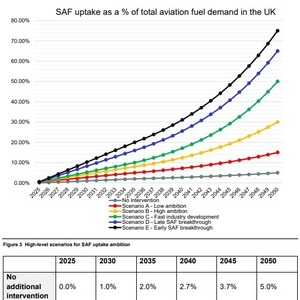UK seeks public comments on proposed SAF mandate

July 26, 2021
BY Erin Krueger
The U.K. Department for Transport on July 23 opened a public consultation on a proposal that would establish a sustainable aviation fuels (SAF) mandate requiring jet fuels suppliers to blend an increasing portion of SAF into aviation fuel starting in 2025.
A consultation document released by the U.K. government offers five scenarios for the proposed mandate. All would start with a proposed 0.5 percent SAF requirement in 2025, but would ramp up a vasty different rates, requiring between 15 percent and 75 percent SAF blends by 2050.
Advertisement
Advertisement
The Department for Transport is seeking public comments on the need for a SAF mandate; high-level ambition and design of the proposed SAF mandate; fuel eligibility criteria; interactions between SAF and other domestic and international policy; and compliance, reporting and verification principles that will steer the creation of the scheme.
Velocys issued a statement welcoming the SAF mandate consultation. “SAF mandates could play an important part in enabling aviation to decarbonize,” said Andrew Morris, chief financial officer of Velocys. “Velocys welcomes the government’s consultation in this area and its theme of setting ambitious but realistic targets for carbon reduction. But as the Transport Secretary himself states, this should also be the beginning of a conversation on providing price certainty for investment into this nascent sector.
“Combined with SAF mandates, a price support mechanism that ensures stable prices for SAF will go a long way to giving investors the confidence they need to invest in UK SAF production and supply to deliver the Jet Zero ambition,” he continued.
Advertisement
Advertisement
“Last month Velocys’ technology enabled the world’s first commercial flight fuelled with SAF derived from wood chips, demonstrating that ours is a ‘here and now’ technological solution to decarbonising aviation,” Morris added. “We look forward to responding to this consultation and the jet zero consultation, whilst proceeding with the development of our waste-to-SAF plant near Immingham.”
The consultation is open through Sept. 19. Additional information is available on the U.K. Department for Transport website.
Related Stories
CoBank’s latest quarterly research report, released July 10, highlights current uncertainty around the implementation of three biofuel policies, RFS RVOs, small refinery exemptions (SREs) and the 45Z clean fuels production tax credit.
The U.S. Energy Information Administration maintained its forecast for 2025 and 2026 biodiesel, renewable diesel and sustainable aviation fuel (SAF) production in its latest Short-Term Energy Outlook, released July 8.
XCF Global Inc. on July 10 shared its strategic plan to invest close to $1 billion in developing a network of SAF production facilities, expanding its U.S. footprint, and advancing its international growth strategy.
U.S. fuel ethanol capacity fell slightly in April, while biodiesel and renewable diesel capacity held steady, according to data released by the U.S. EIA on June 30. Feedstock consumption was down when compared to the previous month.
XCF Global Inc. on July 8 provided a production update on its flagship New Rise Reno facility, underscoring that the plant has successfully produced SAF, renewable diesel, and renewable naphtha during its initial ramp-up.
Upcoming Events










